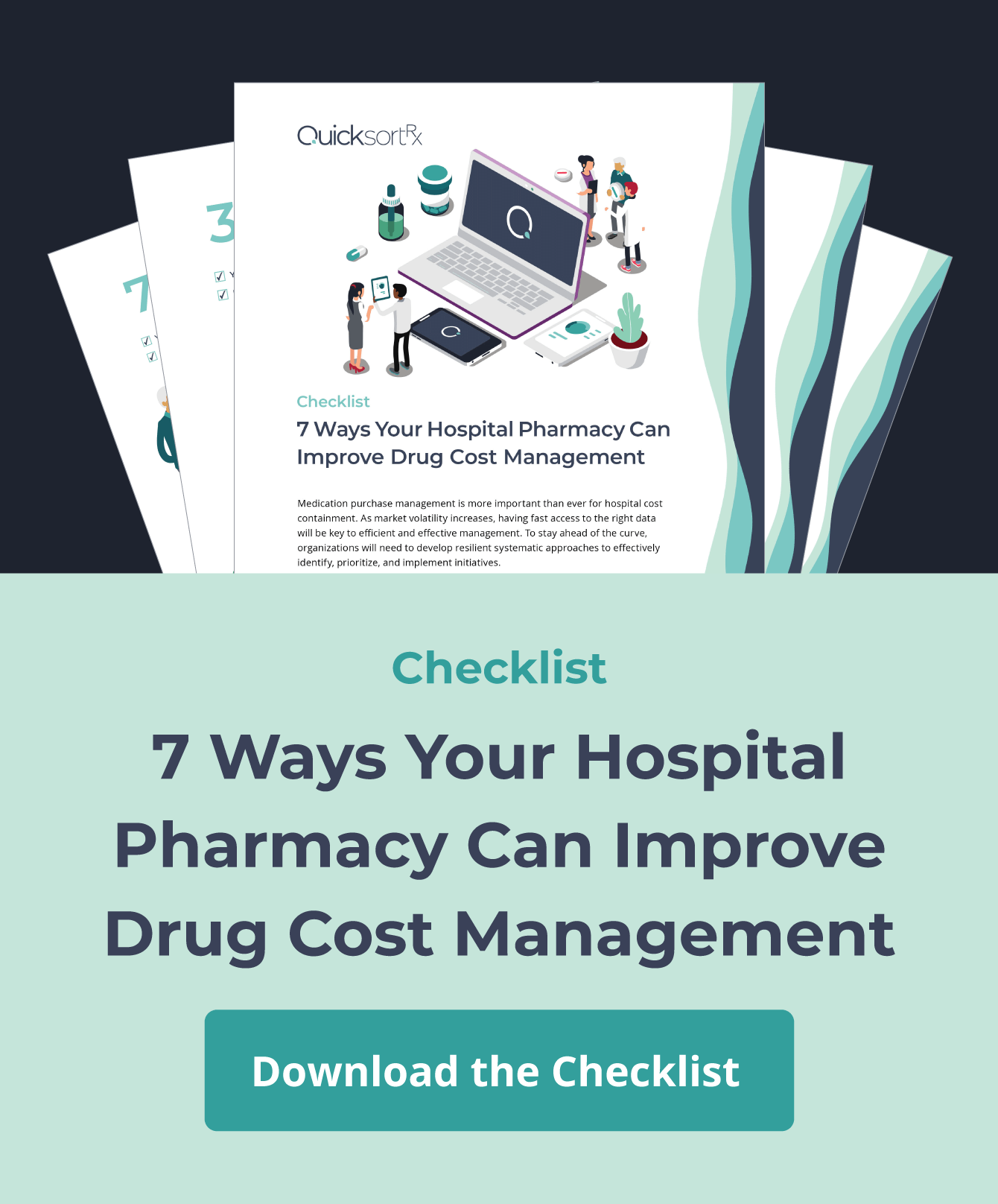Top Questions When Choosing a Pharmacy Data Analytics Vendor for Your Hospital

Staying on top of med spend is challenging. Data is constantly shifting - from pricing to contract terms to discount opportunities, from different sources to inventory to utilization.
Without the right pharmacy data analytics, proper prioritization of savings opportunities is difficult. Manually approaching pharmacy data management given the scope and pace of change is too challenging, often leading to delays or inaccuracies in decision-making. In addition, the effects of any shift in purchase strategy can be hard to project quickly, and med spend insights are often limited. As a result, hospital pharmacy teams are increasingly turning to automation for faster, more complete, and more effective pharmacy procurement.
However, not all pharmacy data analytics tools are created equal.
As you begin vetting pharmacy management software options to improve med spend analysis at your organization, consider the following questions.
10 Questions When Choosing a Pharmacy Data Analytics Partner
1. Will you be receiving insights specific to med spend savings opportunities?
Be wary of one-size-fits-all solutions. General business intelligence isn’t enough. When it comes to pharmacy analytics, you need a tool specific to the task at hand. Features to consider include automated opportunity alerts, real-time purchase oversight, instant reporting and analysis, and automatic notifications for contract changes, account discrepancies, and pricing errors.
2. Will you be working with my data specifically?
It’s a valid assumption that your pricing and contract data will be the focus of any analysis. However, some vendors take the approach of merely notifying users of pricing shifts, or they may aggregate data to provide purchasing guidance. The right pharmacy data analytics vendor will work with your organization’s exact data and circumstances –– inventory, utilization, GPO contract terms, WAC spend, wholesaler contract agreements, etc. An absence of data specific to you will result in an incomplete — and often inaccurate — set of assumptions and purchasing direction.
Also important is the ability to view your data and analysis in a most helpful way for decision-making. For example, the right pharmacy management software will give you a complete view of purchasing across accounts in the enterprise with the ability to drill down as necessary, such as by regions, facilities, ownership, or 340B status. You should also be able to view in real-time and compare spending against your historical data for context.
3. Will my data be sold?
Some vendors will take your data and sell it to third-party companies. Always seek a vendor that only partners with health systems and has systems in place to keep your hospital’s information secure.
4. Is your guidance neutral and broad enough in scope?
Accurate med spend analysis and prioritization are based on a total view of your purchasing options, potential impacts, and neutral insights. If you’re seeing only a portion of data that goes into pricing or the insights you receive are limited to a particular perspective, then the basis for making decisions risks being skewed.
5. Will information and insights be based on recent data?
If you’re making decisions based on data that isn’t current, then you could be making incorrect assumptions. There may also be a lag before opportunities are identified, causing your health system to pay more than it should. For example, consider a purchasing switch based on data that is 30 days old — that’s a month of overspending that will have occurred before your team can act. Real-time data is the best for effective decision-making.
6. Will using the pharmacy data analytics tool be practical?
The design should be user-friendly and intuitive to maximize adoption across the pharmacy team. If you’re feeling flooded with alerts or drowning in too much data to draw insights, it’s a sign that your team will be frustrated using the tool.
7. Will data and insights be easy to access?
The right solution will support mobile access, so your team can view information wherever and whenever needed. When leadership questions a price change in a meeting, the right pharmacy data management tool will enable pharmacy leaders to respond immediately.
8. Will you have support from people who have worked in the field?
Some pharmacy management software is developed by companies heavy on tech knowledge but short on actual pharmacy experience. The right vendor should understand the day-to-day demands and opportunities facing the pharmacy team, from GPO dynamics to the role of pharmacy operations within the larger enterprise to demands on pharmacy staff. Technology design, user experience, implementation, and training will go smoothest when working with a vendor that has extensive pharmacy backgrounds.
9. Will communication of our data and related insights be secure?
Only some companies will come from a healthcare background and be as familiar with stringent security protocols. Always ask about measures in place to ensure your data will be secure.
10. Is the pharmacy data analytics vendor invested in my success?
Consider whether your vendor is guaranteeing outcomes and doing so in writing. Is it a risk-share model that puts the onus on the vendor to help you achieve your goals and not just take credit for your team’s hard work? A vendor with skin in the game is likelier to invest time and support to ensure your organization achieves its short- and long-term goals.


